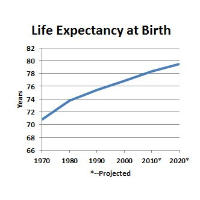More Scientists, More Money, More New Drugs…but Little Progress in Life Expectancy
 (graphic: Steve Straehley, AllGov)
(graphic: Steve Straehley, AllGov)
More and more money is being spent in the United States on health, creating more positions for scientists and developing more new drugs. But these investments are not adding up to noticeable increases in life expectancy.
Arturo Casadevall and Anthony Bowen, researchers at Johns Hopkins Bloomberg School of Public Health, say in a report published in the Proceedings of the National Academy of Sciences that the nation has witnessed a diminished return on its investments over the past 50 years on biomedical research when it comes increasing human lifespans.
Since 1965, the U.S. has had a nine-fold increase in the number of scientists, while the National Institutes of Health budget has expanded four-fold. The rate of new drugs hitting the market has not been as strong, but the number has doubled during this span. But life expectancy gains have remained constant at about two months per year, Hopkins reported.
“There is something wrong in the process, but there are no simple answers,” Bowen said. “It may be a confluence of factors that are causing us not to be getting more bang for our buck.”
The researchers cited several possible factors: too much regulation on research; the difficulty of finding cures for complex diseases like Alzheimer’s; and “perverse” incentives for researchers to produce questionable research so they can get published in journals. According to Hopkins, one study estimated that more than $28 billion is spent each year in the United States on preclinical research that can’t be reproduced and that these studies comprise 50% of the literature.
“Scientists, regulators and citizens need to take a hard look at the scientific enterprise and see which are problems that can be resolved,” co-researcher Arturo Casadevall said. “We need a system with rigor, reproducibility and integrity, and we need to find a way to get there as soon as we can.”
-Noel Brinkerhoff
To Learn More:
Return on Investment Slipping in Biomedical Research (Johns Hopkins Bloomberg School of Public Health)
Expectation of Life at Birth, 1970 to 2008, and Projections, 2010 to 2020 (U.S. Census Bureau) (pdf)
- Top Stories
- Unusual News
- Where is the Money Going?
- Controversies
- U.S. and the World
- Appointments and Resignations
- Latest News
- Trump to Stop Deportations If…
- Trump Denounces World Series
- What If China Invaded the United States?
- Donald Trump Has a Mental Health Problem and It Has a Name
- Trump Goes on Renaming Frenzy






Comments